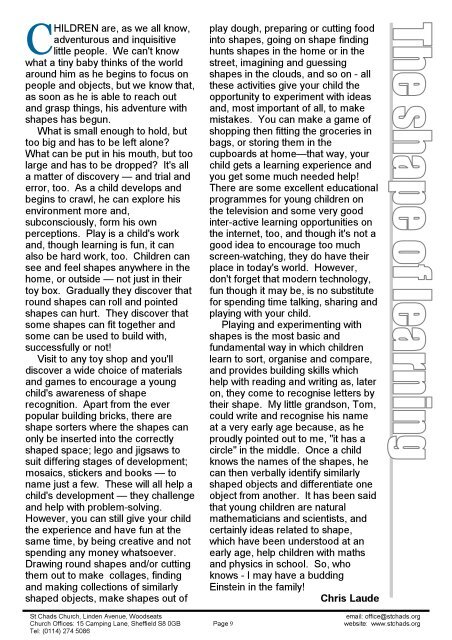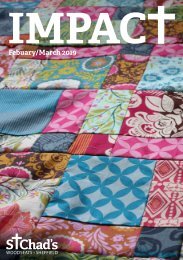Create successful ePaper yourself
Turn your PDF publications into a flip-book with our unique Google optimized e-Paper software.
C<br />
HILDREN are, as we all know,<br />
adventurous and inquisitive<br />
little people. We can't know<br />
what a tiny baby thinks of the world<br />
around him as he begins to focus on<br />
people and objects, but we know that,<br />
as soon as he is able to reach out<br />
and grasp things, his adventure with<br />
shapes has begun.<br />
What is small enough to hold, but<br />
too big and has to be left alone?<br />
What can be put in his mouth, but too<br />
large and has to be dropped? It's all<br />
a matter of discovery — and trial and<br />
error, too. As a child develops and<br />
begins to crawl, he can explore his<br />
environment more and,<br />
subconsciously, form his own<br />
perceptions. Play is a child's work<br />
and, though learning is fun, it can<br />
also be hard work, too. Children can<br />
see and feel shapes anywhere in the<br />
home, or outside — not just in their<br />
toy box. Gradually they discover that<br />
round shapes can roll and pointed<br />
shapes can hurt. They discover that<br />
some shapes can fit together and<br />
some can be used to build with,<br />
successfully or not!<br />
Visit to any toy shop and you'll<br />
discover a wide choice of materials<br />
and games to encourage a young<br />
child's awareness of shape<br />
recognition. Apart from the ever<br />
popular building bricks, there are<br />
shape sorters where the shapes can<br />
only be inserted into the correctly<br />
shaped space; lego and jigsaws to<br />
suit differing stages of development;<br />
mosaics, stickers and books — to<br />
name just a few. These will all help a<br />
child's development — they challenge<br />
and help with problem-solving.<br />
However, you can still give your child<br />
the experience and have fun at the<br />
same time, by being creative and not<br />
spending any money whatsoever.<br />
Drawing round shapes and/or cutting<br />
them out to make collages, finding<br />
and making collections of similarly<br />
shaped objects, make shapes out of<br />
play dough, preparing or cutting food<br />
into shapes, going on shape finding<br />
hunts shapes in the home or in the<br />
street, imagining and guessing<br />
shapes in the clouds, and so on - all<br />
these activities give your child the<br />
opportunity to experiment with ideas<br />
and, most important of all, to make<br />
mistakes. You can make a game of<br />
shopping then fitting the groceries in<br />
bags, or storing them in the<br />
cupboards at home—that way, your<br />
child gets a learning experience and<br />
you get some much needed help!<br />
There are some excellent educational<br />
programmes for young children on<br />
the television and some very good<br />
inter-active learning opportunities on<br />
the internet, too, and though it's not a<br />
good idea to encourage too much<br />
screen-watching, they do have their<br />
place in today's world. However,<br />
don't forget that modern technology,<br />
fun though it may be, is no substitute<br />
for spending time talking, sharing and<br />
playing with your child.<br />
Playing and experimenting with<br />
shapes is the most basic and<br />
fundamental way in which children<br />
learn to sort, organise and compare,<br />
and provides building skills which<br />
help with reading and writing as, later<br />
on, they come to recognise letters by<br />
their shape. My little grandson, Tom,<br />
could write and recognise his name<br />
at a very early age because, as he<br />
proudly pointed out to me, "it has a<br />
circle" in the middle. Once a child<br />
knows the names of the shapes, he<br />
can then verbally identify similarly<br />
shaped objects and differentiate one<br />
object from another. It has been said<br />
that young children are natural<br />
mathematicians and scientists, and<br />
certainly ideas related to shape,<br />
which have been understood at an<br />
early age, help children with maths<br />
and physics in school. So, who<br />
knows - I may have a budding<br />
Einstein in the family!<br />
Chris Laude<br />
St Chads Church, Linden Avenue, Woodseats<br />
email: office@stchads.org<br />
Church Offices: 15 Camping Lane, Sheffield S8 0GB Page 9 website: www.stchads.org<br />
Tel: (0114) 274 5086


















